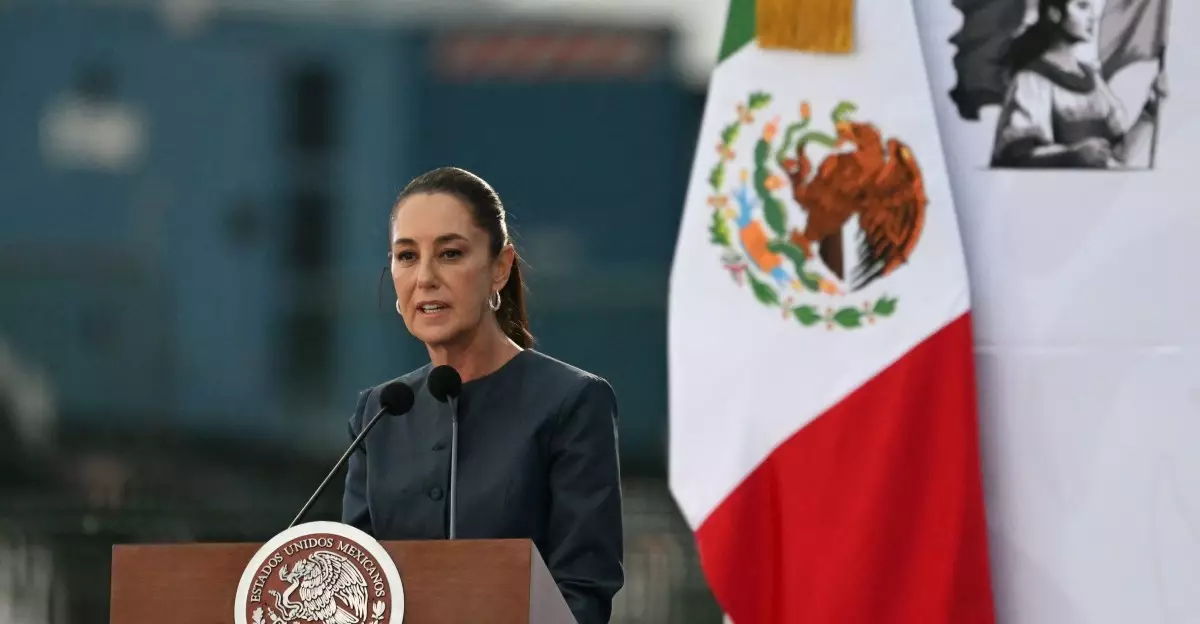In a world interconnected by technology, names carry significant weight, serving as markers of identity, culture, and history. Recently, a contentious clash erupted between Mexico and the United States over the designation of one of the world’s largest bodies of water—the Gulf of Mexico. Led by Mexican President Claudia Sheinbaum, the Mexican government has launched a legal battle against tech giant Google for its decision to label parts of the Gulf as the “Gulf of America” in its mapping services. This conflict highlights not just the fragility of international relations but also the profound implications of naming conventions in an era dominated by digital infrastructure.
The impetus for this dispute can be traced back to a presidential order by former U.S. President Donald Trump, who insisted that the Gulf be rebranded in maps and media. This directive was met with significant pushback from various quarters, including the Mexican government, which viewed it as an overreach of authority. In a press conference, President Sheinbaum articulated her government’s stance, affirming that the decree issued by the U.S. lacks jurisdiction over Mexico’s territorial waters, which should rightly remain designated as the Gulf of Mexico.
Geopolitical Implications of a Name Change
The U.S. administration’s insistence on changing the Gulf’s name illustrates a broader trend of how states can experiment with identity through nomenclature. Names are not mere labels; they are often tied to cultural, historical, and political significance. The attempt to alter the Gulf’s designation poses a threat to the historical respect and recognition of Mexico’s sovereignty over its geographic spaces. By challenging Google’s policy on international maps, Sheinbaum is not merely defending a name; she is advocating for Mexican heritage and affirming its rightful place in the global narrative.
Moreover, the attempt to redefine the Gulf of Mexico within the confines of American political ideologies raises critical questions about the scope of a nation’s power over geographical nomenclature. Can one country assert naming rights over a shared body of water? The waters of the Gulf are not merely a boundary; they are intertwined with the identities of those who dwell along its shores. For Mexico, asserting the name “Gulf of Mexico” is a matter of national pride, cultural identity, and preserving a historical legacy that transcends the arbitrary whims of political power.
The Digital Landscape and Global Response
Google’s decision to adapt its mapping services to align with Trump’s name change exemplifies how digital platforms can perpetuate national narratives. By incorporating the “Gulf of America” label, Google has inadvertently participated in a political act, as names directly influence people’s perception of geography and, consequently, national identity. In this digital age, information dissemination and perception manipulation are powerful tools that can sway public opinion and international sentiments.
The legal action taken by the Mexican government is unprecedented, reflecting a significant shift in how countries might navigate conflicts with tech giants. Naming has become a digital battleground, where multinational corporations hold immense responsibilities that extend far beyond profit motives; they have the power to shape perceptions of nationhood and territory.
Furthermore, Sheinbaum’s call for compliance with the decree issued by the U.S. government calls for accountability from tech companies like Google. It asserts that corporations should uphold international standards rather than act as extensions of a nation’s political agenda. The implications of this lawsuit could extend beyond the Gulf of Mexico, as other nations facing similar situations may also seek reparative visibility in the digital landscape.
The Future of Naming and Identity
This dispute transcends a simple clash of names; it embodies the ongoing struggle for identity in an increasingly globalized world. As geopolitics continually reshape national boundaries and relationships, the naming of places serves as a reflection of power dynamics. As nations like Mexico assert their rights to define their geographical identifiers, a pivotal opportunity arises for dialogue focusing on mutual respect and understanding between nations.
The ongoing legal proceedings against Google also highlight the responsibilities of technology companies. They must recognize their role in shaping public perceptions and accept the weight of their influence over global narratives. At its core, this controversy is a striking reminder of how intertwined technology, politics, and identity have become in the contemporary landscape. Will we see a shift where names reflect true ownership and history, or will they continue to be manipulated by the winds of political change? The resolution of this conflict may set important precedents for how we understand, uphold, and navigate the names and identities of our interconnected world.


Leave a Reply